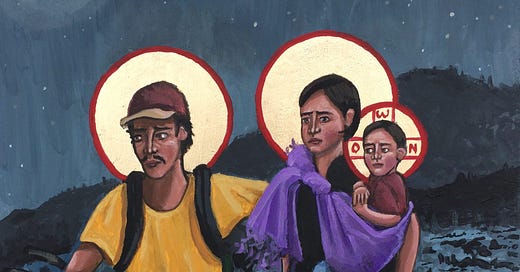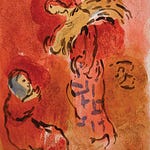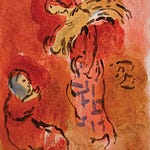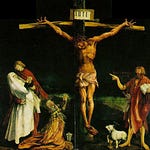“He who sustains the world lay in a manger, a wordless Child, yet the Word of God. Him whom the heavens do not contain, the bosom of one woman bore. She ruled our King; she carried Him in whom we exist; she fed our Bread.”
-St. Augustine
When Jesus calls us to receive the little children in his name and to become little children ourselves he is not speaking of some reality that he knows nothing of. As Hans Urs von Balthasar says, Jesus knows what it is to be a child by experience.1
This week we meditated on the fact that God became a little child precisely because God is childlike. God doesn’t have to change his nature in order to come as a helpless baby. It is the most fitting way he could come among us.
The deep mystery of Christmas is that God comes among us as a little child. But the mystery deepens. Our God not only becomes a child at Christmas, he is eternally a Child: the eternal Son of the Father.
John 1:18 tells us that “No man hath seen God at any time, the only begotten Son, which is in the bosom of the Father, he hath declared him.”
The mystery of Christmas is that the Son has eternally been “carried” in the bosom of his Father. And he never grows-up or grows-out of that childlike relationship he has with his Father. Everywhere he goes he is cradled in the Father’s bosom.
But in order to share this relationship with us Jesus makes it so that the relationship he has with his Father from all eternity becomes the same relationship he has with his mother. He is in the Father’s bosom. He is in Mary’s bosom.
Jesus trusts God for all things. He lives in dependence on his Father. He gives thanks to his Father. He cries out to his Father. He rests in his Father’s embrace.
Jesus trusts his Mother for all things. He depends on his Mother. He thanks her for carrying him. He cries out in the night for her. And he rests in her embrace.
And this relation of dependence is how he is saving Mary. By needing her and Joseph—in the way only God can be need— he is giving grace to them.
He does the same for each of us. In every child that we welcome in his name he is depending on us. He asks us to carry him in the children around us, and by doing so he is giving us grace on top of grace to become children of his Father.
As Chris Green puts it: “The promise of Christmas is that God the Son became a child of his Mother so that you and I might become children of his Father.”2
Here are the quotes from Hans Urs von Balthasar that we reflected on:
A child, therefore, is not merely a distant analogy for the Son of God: Whoever turns with loving concern ‘to such a child’ (any one out of hundreds of thousands), and does this, consciously or unconsciously, in the name of Jesus, of one mind with him—that person is welcoming the archetypical Child who has his abode in the Father’s bosom.
***
Love is what enables the child to experience its absolute neediness as something other than a threat, since it is lived as the situation in which the mother’s ever-latent love may be realized always anew.
***
In everything the human child is dependent on free acts of giving by others: in him, plea and thanks are still indistinguishably one. Because he is needy he is also thankful in his deepest being…And when he grows older and we say to him ‘Say please’, ‘say thank you’, we are not teaching him anything new but only trying to bring into his more conscious sphere what is already present from the beginning.
***
Here we see the source of the prohibition in the Sermon on the Mount against worrying about the morrow, and of the request in the Our Father that asks only for today’s bread. Such things are understandable only coming from the children of God, for, when children ask for something, they always do so in the emphatic present, and when they sit down at a full table they never think of tomorrow’s meal.3
And the quote from G.K. Chesterton:
Because children have abounding vitality, because they are in spirit fierce and free, therefore they want things repeated and unchanged. They always say, "Do it again"; and the grown-up person does it again until he is nearly dead. For grown-up people are not strong enough to exult in monotony. But perhaps God is strong enough to exult in monotony. It is possible that God says every morning, "Do it again" to the sun; and every evening, "Do it again" to the moon. It may not be automatic necessity that makes all daisies alike; it may be that God makes every daisy separately, but has never got tired of making them. It may be that He has the eternal appetite of infancy; for we have sinned and grown old, and our Father is younger than we.4
Hans Urs von Balthasar, Unless You Become Like This Child
Listen to Chris Green’s sermon “Growing Down into Childlikeness”
Balthasar, Unless You Become Like This Child
G.K. Chesterton, Orthodoxy














Share this post